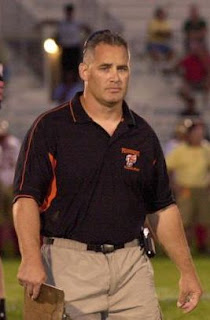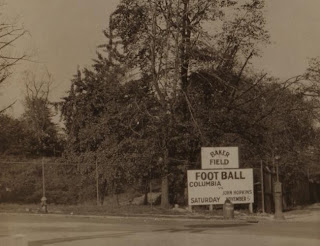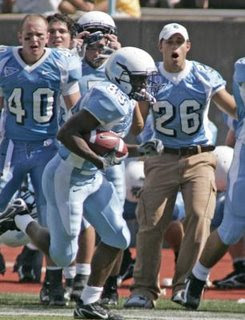
The author and Matt Sodl, April 2008
Matt Sodl '88 played his heart out during his four years at Columbia, and despite going 0-10 in his senior season, he was named to the All-Ivy First Team in 1987.
Once again, there's not much valuable that I could add now to an interview I did of today's subject, so here it is reprinted below:

Matt Sodl (No. 65) Makes a Tackle
Longtime readers of this blog are familiar with my special admiration for the seniors on the 1987 Columbia Lions football team.
They stuck with the team and worked hard, despite compiling an 0-30 record during their three-year varsity careers, (freshmen were not eligible to play varsity ball back then). Eleven players from that '87 team stayed with the program all four years.

The 1984 Lion Cubs, Matt Sodl, No. 65, is in front
One of the best players on that team and the strongest was defensive tackle Matt Sodl. Matt came to Columbia in 1984 from rural Pennsylvania and made an immediate impact on the freshman team. By his sophomore season, he was starting at nose tackle, recording 59 tackles and three sacks.
But as a senior in 1987, Sodl truly broke out as a first-team All-Ivy player (unanimous selection), with 84 tackles, 5.5 sacks and 10 tackles for a loss.
During Matt's 0-30 varsity run, not many of the games were close. But two of the last three games of his career became some the most excruciating losses in Lion history.
Leading at home against Dartmouth by a 10-9 score, the Big Green pulled out a late FG to take the 12-10 lead, only to see the Lions return the ensuing kick-off very close to field goal territory.
Columbia indeed got into position to try the winning field goal, but it went just wide, (after a five-yard false start on the first attempt...of course, the actual kick hooked just about five yards from the goal post).
Two weeks later against Brown in Providence, a late Bear fumble was nullified by the officials in one of the worst calls in Ivy football history. Brown kept the ball and went in for the winning score in a 19-16 season-ending win.
But Matt Sodl is proud to have played on this team and for Columbia. And he remains a very strong supporter of Columbia football in many ways.
Today Matt is now Managing Director and Co-Founder of Innovation Capital, where he runs the investment banking firm that has a specialty in the gaming, hospitality, and entertainment industries.
Matt is often quoted in the Wall Street Journal, Bloomberg, BusinessWeek and the Las Vegas Sun and was named to Investor Dealers' Digest's "40 under 40" list in 2006.
Most importantly, he recently appeared as a guest on FOX Business Network.
Matt was good enough to do an interview for ROAR LIONS ROAR.
Jake: Tell us about where you grew up. Football was obviously a big part of life in that part of Pennsylvania, but how many guys thought about going to the Ivies to play ball?
Matt: I attended Whitehall High School, which is located in a farm community just outside of Allentown, Pa. The school is best known for its famous alum Matt Millen who grew up down the road from my neighborhood.
The Ivy League certainly wasn't in the mindset of any of us growing up. All we heard about was Penn State, Pitt, West Virginia, and Notre Dame.
Our high school football program was populated with several Parade All-American players who played at these schools.
I remember Joe Paterno, Bobby Bowden, and Bo Schembechler visiting our school, walking through our weight room...I think you get the point.
Most of my teammates were focused on playing for Division 1-A schools. Of the 17 seniors in my class, I believe 13 of our players went to play football at a Division 1-A or 1-AA school.
J: Give us some highlights of your high school career on and off the field.
M: Our high school team was all about winning...competing against the largest schools in the state of Pennsylvania. We lost three games in four years. We had some phenomenal athletes who could really play the game.
I played defensive line, was a two-year starter and earned All-State honors my senior season.
In the off-season, we lifted weights year-round and actually competed as a powerlifting team, (comprised of nearly all offensive and defensive linemen), where we won the Pennsylvania state championships several years in a row.
The off-season weight training program was ahead of its time. The offensive line coach expected all of the football players to lift weights year-round...beginning the Monday after Thanksgiving (right after our last game), and up and through summer camp.
It was here in high school, thanks to my coach, John Bendekovitz, that I learned the type of work ethic and dedication that it takes to compete and win.
J: How did you come to Columbia? Who recruited you and what was the recruitment process like?
M: The recruiting process at our school was interesting. When the Division 1-A schools looked at our game film, they mostly were focused on my teammate Chris Parker, who was a 6-7, 290-pound defensive lineman who played next to me.
Parker went on to be a Parade All-American and star at WVU. My 5-10, 220-pound frame obviously didn't excite the Division 1-A schools. A number of Division 1AA schools from the Ivy League and Patriot League recruited me.
That was when I met Jim Benedict, Columbia's Freshman Coach at the time. He met with me in our guidance counselor's office and literally unveiled a model of the Wein Stadium.
He said the stadium was under construction, that they were playing games in Giants Stadium and invited me for an official visit. Benedict was a class act and on my visit did all he could to keep my parents calm.
As you can imagine, the initial idea of their son living in New York City didn't sit too well my parents who had lived their lives in a small farm community in eastern Pennsylvania.
Ultimately, I focused on the long-term and felt that an Ivy League education would create many more opportunities for me down the road as opposed to a Patriot League school.
In my business today, I don’t come across too many Patriot football alums. But I run across Ivy League football alums all the time.
J: What do you remember about your first training camp and the 1984 freshman football season?
M: Our first training camp was up at Baker Field. It was my first exposure to the infamous bus ride, which in those days was straight through Harlem. Certainly an eye opener for me.
Breakfast was a chocolate donut from "Twin Donut" and an orange juice. Hardly the breakfast of champions. In terms of the Freshman team, the diversity of the athletes was quite astounding.
We had some great athletes...we also had some offensive linemen who looked as if they'd never seen a squat rack in their lives...a vast departure from my high school days.
In all, as a team we developed a bond that was an "us vs. the world" mentality. And, while we are the class known for not winning a single game in four years...I'm here to remind you that we did win our very first Freshman game against Lafayette.
It may not count in the NCAA record books, but it was nice to play near my hometown and get a win.
It is important to note that there were 11 players from that freshman team that had the fortitude and commitment to play all four years and not experience a win as a varsity player.
Each of us handled the tough times in a different manner but all told, we believed that we could win as a team at Columbia. We played through adversity and used that experience to “wins” in our careers and personal lives after we graduated.
The names of these 11 players are: Mike Bissinger, Phil Fusco, George Gianfrancisco, Mike Lavelle, Dave Putelo, Nick Leone, John Miller, Tony Natola, Rich Ritter, Paul San Fillipo, and Matt Sodl.
J: What was it like adjusting to life on campus and in NYC?
M: There was certainly an adjustment period necessary coming from rural Pennsylvania. However, as a team we went through it together and that provided the support group we all needed to adapt.

The coaches during The Streak: Bob Naso, Jim Garrett and Larry McElreavy
J: Coach Garrett was in charge during your sophomore year. Most of the players I’ve spoken to from that year say they actually like Jim despite the ugly way his career ended at CU. Are you in that camp as well?
M: Coach Garrett is certainly a lightning rod for discussion. My take is that his vision for the program; his quality coaching staff; his expectations; his offensive and defensive schemes; his ability to recruit...ALL were on point.
And, yes I am in the camp that like the guy and wish things could have ended differently. I have no doubt that we would have been quite competitive in subsequent years (Garrett brothers notwithstanding) if he had stayed on as head coach.
All that said, I think the post-game press conference after the Harvard game got the better of him. I'll leave it at that.
Coach Garrett is certainly remembered for his "catch phrases" and impassioned speeches...especially the one in the first meeting where he predicted we would go "10-0" that very first season. We all wanted to believe.
J: What was the transition period over to Coach MacElreavy like?
M: Coach Mac was a tough, hard nosed and no-nonsense guy. He had a proven track record on the college level, so I think the comfort level was there that we could turn this program around.
I think Coach Mac shared the same passion for the game as Coach Garrett. That said, I think he was much more approachable than Garrett.
J: As the streak continued, what pressures did you feel on the field and on campus week after week?
M: Living in the media capital of the world that is NYC didn't allow us to forget about the Streak. As the losses mounted, it seemed that the intensity of the press coverage increased.
It got to a point where NFL Films and Sports Illustrated were practically a part of the team, riding the bus with us to practice, etc. The one element that I did not appreciate was the support (or lack thereof) of the student body.
I truly believe there was a pretty large faction of the students who wanted us to continue losing.
I still remember the group of students huddled around Coach Mac shouting "We're No. 1" after we broke Northwestern's losing streak. Still makes me sick to this day.
J: Did the losses help you focus on life after college a little better than perhaps a player on a team that won every week?
M: I think whether we won or lost, we had no choice but to focus on our school work.
J: Did you have a very different outlook going into the ’87 season? Did you think that this would be the year more than you did in ’85 or ’86?
M: In the '87 season, I was a senior and tried to be a leader...leading by example. The finality of being a senior really drove my intensity.
I did not want to end my career without a "W" so I played every day (practice and game) as if it was the last time I would step on the field. I think that intensity level carried over to many of my teammates.
Also, Tom Gilmore (our defensive line coach) was a big factor for my elevated playing level my senior season. Playing for a Bushnell Cup winner and thriving off his intensity was something I internalized and that helped me take my game to the next level.

Tom Gilmore, 1985's Bushnell Cup Winner
J: What was it like after those Dartmouth and Brown losses in ’87. How hard was it to cope in the days immediately afterward?
M: Words cannot describe the emotions. After 3 1/2 years, having a "W" in your grasp only to be taken from you. We truly believed we would win those games.
Dartmouth: one field goal, wide left. So close.
Brown: game winding down. Brown fumbles inside our five-yard line. We couldn't stay on the ball. You’re supposed to win those games.
I think we all felt numb in the days following those games. Feeling that there is no such thing as a moral victory.
J: Tell us about your playing career after college.
M: I loved the game of football and wished I could have extended my career after Columbia. That said, my 5-10 frame would only take me so far.
J: How did you get into your current line of work, and did you try anything else before getting into the financial world?
M: Like many college students looking to break onto Wall Street, I began my career as a financial analyst at a boutique investment banking firm. I was introduced to the firm by a Columbia alum, Eldridge Gray.
J: Do you think your lack of wins in college spurred you on to better things post-graduation?
M: My Columbia football experience is without question the single most important driver in my career. It taught me to prepare daily; compete harder; the need to work through adversity; and most importantly appreciate victory and success.

Matt Sodl & Son
J: Do you keep it touch with your former teammates, and do you know what they’re up too?
M: I do keep in touch with many of the guys in the class of 1988 and surrounding classes. Our 20-year reunion is coming up and I hope to see many of them. No doubt we will be sharing football war stories.

Matt Sodl and wife Cathy have three children and live in a beach community just outside of Los Angeles.


















